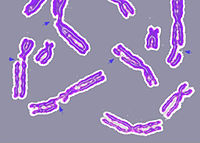
Photo from wikipedia
Giant pandas are unique within Carnivora with a strict bamboo diet. Here, the epigenomic profiles of giant panda liver and pancreas tissues collected from three important feeding stages were investigated… Click to show full abstract
Giant pandas are unique within Carnivora with a strict bamboo diet. Here, the epigenomic profiles of giant panda liver and pancreas tissues collected from three important feeding stages were investigated using BS-seq. Few differences in DNA methylation profiles were exhibited between no feeding and suckling groups in both tissues. However, we observed a tendency toward a global loss of DNA methylation in the gene-body and promoter region of metabolism-related genes from newborn to adult. Correlation analysis revealed a significant negative correlation between the changes in methylation levels within gene promoters and gene expression. The majority of genes related to nutrition metabolism had lost DNA methylation with increased mRNA expression in adult giant pandas. The few galactose metabolism and unsaturated fatty acid metabolism related genes that were hypomethylated and highly-expressed at early stages of giant panda development may meet the nutritional requirement of this species' highly altricial neonates.
Journal Title: Genomics
Year Published: 2022
Link to full text (if available)
Share on Social Media: Sign Up to like & get
recommendations!